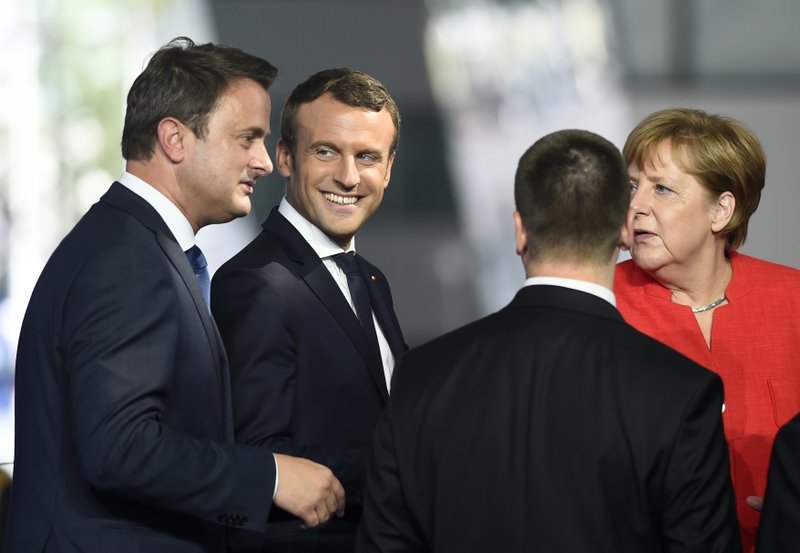TAORMINA, Italy -- Within days of taking the French presidency, Emmanuel Macron faced a string of diplomatic tests -- pushing the Paris climate deal on a skeptical Donald Trump, rallying European allies to do more to fight Syria's extremists, and now hosting Vladimir Putin.
The packed schedule was deliberate. Macron is eager to dispel doubts about his presidential stature that have dogged him since he launched a wild-card presidential bid just six months ago.
He struck up a chummy rapport in his first meetings with Trump, winning an apparent handshake contest and the U.S. president's cellphone number, despite their stark political differences.
German Chancellor Angela Merkel has met Macron three times in the two weeks since he took office, and she is pinning hopes on him to boost Europe's economy and unity.
While Macron has never held elected office before, he was helped by his comfortable English and backstage knowledge of international summits gained as top economic adviser to predecessor Francois Hollande from 2012 to 2014, then as his economy minister.
Beyond the important issues Macron is tackling, his body language drew the most public attention on his summit outings.
The most symbolic image was his handshake with Trump at their first meeting, in Brussels. After some friendly chatter, the two gripped each other's hands so tightly before the cameras that their jaws seemed to clench.
Macron later described the handshake as "a moment of truth" -- designed to show that he's no pushover.
"My handshake with him, it wasn't innocent," Macron told the weekly newspaper Le Journal du Dimanche for Sunday's edition, in comments confirmed by his office. "One must show that you won't make small concessions, even symbolic ones."
The next day at the Group of Seven summit in Sicily, Macron attracted attention for his friendly interactions with Canadian Prime Minister Justin Trudeau. At their bilateral meeting, Macron, 39, and Trudeau, 45, went on a terrace overlooking the Mediterranean Sea, where they posed for photographers.
Macron addressed his condolences to British Prime Minister Theresa May in English after the Manchester attack that killed 22 people.
"We were very shocked, because ... we know how this can hurt the people of your country, but more generally for Europe. Because they attack our young, and very young people," Macron told her.
Both leaders pushed to get a separate, unanimous statement on the fight against terrorism by the G-7. The text urges Internet providers and social media companies to more actively fight extremism, an issue widely promoted by Macron during his presidential campaign.
Macron has promised to discuss the Syria crisis today with Russia's president when Putin visits the royal palace in Versailles. There is tension between the two men -- Putin openly supported rival French candidate Marine Le Pen of the far-right National Front party in the presidential race, and Macron has criticized Russia's role in fighting in Syria and Ukraine.
"Russia invaded Ukraine," Macron told a news conference Saturday.
On Syria, where extremists plotted attacks against France and where Europe's migrant crisis began, he said, "I said at the G-7 table that I don't regard it as a collective victory that on Syria ... not one of us was capable of being around the table. You have Russia, Iran and Turkey. That is a defeat."
"So we must talk to Russia to change the framework for getting out of the military crisis in Syria and to build a much more collective and integrated inclusive political solution," he added.
The G-7 called on Russia to respect Ukraine's sovereignty and said they "stand ready to take further restrictive measures in order to increase costs on Russia should its actions so require."
Macron promised he will have a "demanding dialogue with Russia, but it means having a dialogue."
Macron also was optimistic about his relationship with Trump after the G-7 talks.
"I saw someone who listens and who is willing to work," Macron said. "For Mr. Trump and myself, it was a first experience. I think he saw the purpose of these multilateral discussions."
Information for this article was contributed by John Leicester of The Associated Press.
A Section on 05/29/2017
